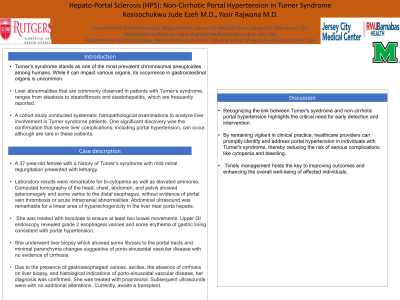Monday Poster Session
Category: Liver
P3109 - Hepato-Portal Sclerosis (HPS): Non-Cirrhotic Portal Hypertension in Turner Syndrome
Monday, October 28, 2024
10:30 AM - 4:00 PM ET
Location: Exhibit Hall E

Has Audio
- KE
Kosisochukwu Ezeh, MD
Marshall University
Charleston, WV
Presenting Author(s)
Kosisochukwu Ezeh, MD1, Yasir Rajwana, MD2
1Marshall University, Charleston, WV; 2Marshall University Joan C. Edwards School of Medicine, Huntington, WV
Introduction: Turner’s syndrome stands as one of the most prevalent chromosomal aneuploidies among humans. While it can impact various organs, its occurrence in gastrointestinal organs is uncommon.
Liver abnormalities that are commonly observed in patients with Turner’s syndrome, ranges from steatosis to steatofibrosis and steatohepatitis, which are frequently reported. A cohort study conducted systematic histopathological examinations to analyze liver involvement in Turner syndrome patients. One significant discovery was the confirmation that severe liver complications, including portal hypertension, can occur, although are rare in these patients.
Case Description/Methods: A 37-year-old female with a history of Turner’s syndrome with mild mitral regurgitation presented with lethargy. Laboratory results were remarkable for bi-cytopenia as well as elevated ammonia. Computed tomography of the head, chest, abdomen, and pelvis showed splenomegaly and some varice to the distal esophagus, without evidence of portal vein thrombosis or acute intracranial abnormalities. Abdominal ultrasound was remarkable for a linear area of hyperechogenicity in the liver near porta hepatis. She was treated with lactulose to ensure at least two bowel movements. Upper GI endoscopy revealed grade 2 esophageal varices and some erythema of gastric lining consistent with portal hypertension. She underwent liver biopsy which showed some fibrosis to the portal tracts and minimal parenchyma changes suggestive of porto-sinusoidal vascular disease with no evidence of cirrhosis.
Due to the presence of gastroesophageal varices, ascites, the absence of cirrhosis on liver biopsy, and histological indications of porto-sinusoidal vascular disease, her diagnosis was confirmed. She was treated with propranolol. Subsequent ultrasounds were with no additional alterations. Currently, awaits a transplant.
Discussion: Recognizing the link between Turner's syndrome and non-cirrhotic portal hypertension highlights the critical need for early detection and intervention. By remaining vigilant in clinical practice, healthcare providers can promptly identify and address portal hypertension in individuals with Turner's syndrome, thereby reducing the risk of serious complications like cytopenia and bleeding. Timely management holds the key to improving outcomes and enhancing the overall well-being of affected individuals.
Disclosures:
Kosisochukwu Ezeh, MD1, Yasir Rajwana, MD2. P3109 - Hepato-Portal Sclerosis (HPS): Non-Cirrhotic Portal Hypertension in Turner Syndrome, ACG 2024 Annual Scientific Meeting Abstracts. Philadelphia, PA: American College of Gastroenterology.
1Marshall University, Charleston, WV; 2Marshall University Joan C. Edwards School of Medicine, Huntington, WV
Introduction: Turner’s syndrome stands as one of the most prevalent chromosomal aneuploidies among humans. While it can impact various organs, its occurrence in gastrointestinal organs is uncommon.
Liver abnormalities that are commonly observed in patients with Turner’s syndrome, ranges from steatosis to steatofibrosis and steatohepatitis, which are frequently reported. A cohort study conducted systematic histopathological examinations to analyze liver involvement in Turner syndrome patients. One significant discovery was the confirmation that severe liver complications, including portal hypertension, can occur, although are rare in these patients.
Case Description/Methods: A 37-year-old female with a history of Turner’s syndrome with mild mitral regurgitation presented with lethargy. Laboratory results were remarkable for bi-cytopenia as well as elevated ammonia. Computed tomography of the head, chest, abdomen, and pelvis showed splenomegaly and some varice to the distal esophagus, without evidence of portal vein thrombosis or acute intracranial abnormalities. Abdominal ultrasound was remarkable for a linear area of hyperechogenicity in the liver near porta hepatis. She was treated with lactulose to ensure at least two bowel movements. Upper GI endoscopy revealed grade 2 esophageal varices and some erythema of gastric lining consistent with portal hypertension. She underwent liver biopsy which showed some fibrosis to the portal tracts and minimal parenchyma changes suggestive of porto-sinusoidal vascular disease with no evidence of cirrhosis.
Due to the presence of gastroesophageal varices, ascites, the absence of cirrhosis on liver biopsy, and histological indications of porto-sinusoidal vascular disease, her diagnosis was confirmed. She was treated with propranolol. Subsequent ultrasounds were with no additional alterations. Currently, awaits a transplant.
Discussion: Recognizing the link between Turner's syndrome and non-cirrhotic portal hypertension highlights the critical need for early detection and intervention. By remaining vigilant in clinical practice, healthcare providers can promptly identify and address portal hypertension in individuals with Turner's syndrome, thereby reducing the risk of serious complications like cytopenia and bleeding. Timely management holds the key to improving outcomes and enhancing the overall well-being of affected individuals.
Disclosures:
Kosisochukwu Ezeh indicated no relevant financial relationships.
Yasir Rajwana indicated no relevant financial relationships.
Kosisochukwu Ezeh, MD1, Yasir Rajwana, MD2. P3109 - Hepato-Portal Sclerosis (HPS): Non-Cirrhotic Portal Hypertension in Turner Syndrome, ACG 2024 Annual Scientific Meeting Abstracts. Philadelphia, PA: American College of Gastroenterology.
